SLO County Safe Parking Site to close. What will happen to residents?
The Kansas Avenue Safe Parking Site, a county pilot program that has served unhoused residents in San Luis Obispo County since summer 2021, is winding down operations and will work to find housing for existing residents before likely closing in the coming months.
The county will no longer accept new people as it begins moving existing residents off the site, which is located along Highway 1 just north of San Luis Obispo, San Luis Obispo County Administrator Wade Horton told The Tribune on Monday.
Kansas Avenue, sometimes called Oklahoma Avenue, opened in August 2021 as part of an emergency response by the county to the growing population of local unhoused residents.
The site is slated to close at an undetermined date this year as a surge in case management and service providers aim to move the residents toward long-term housing solutions.
None of the roughly 70 to 80 residents that currently reside at the Kansas Avenue site will be evicted at this stage, SLO County homeless services division manager Joe Dzvonik said.
“We owe it to them to be honest with ourselves and change strategies and be humane, and take care of the folks that are out there right now,” Dzvonik said. “Not one of them will be ignored or thrown out.”
The county made the decision to work toward closing the Kansas Avenue Safe Parking Site after acknowledging the program failed its objective to serve as a temporary solution for unhoused residents, Horton said. The goal of the site was to be a temporary landing place for unhoused residents as they transition into other temporary or permanent housing.
Horton told The Tribune that dismantling the Kansas Avenue site and implementing a transition plan is “the best way forward” to serve residents and move them toward more stable living conditions.
“We wanted to provide an opportunity for people to transform their lives, and we weren’t meeting the objectives that we initially thought we would,” he said.
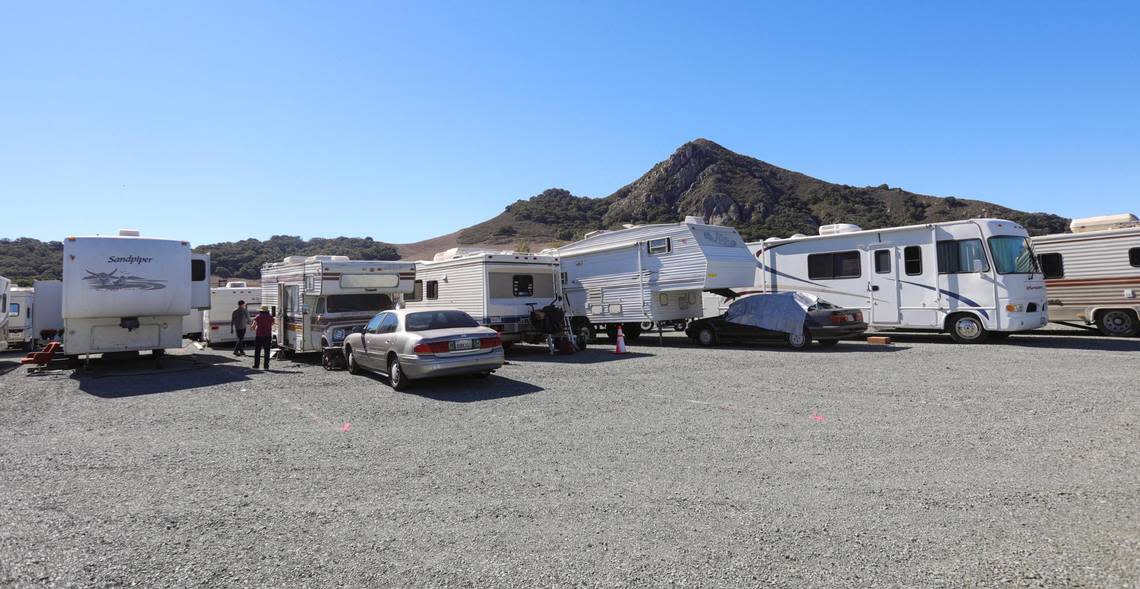
County failed to hire full-time services provider to manage Kansas Avenue site
One of the key challenges was the inability to identify a homelessness services provider to take over operations at the site despite more than a year of recruitment efforts, Horton said.
Instead, the county has relied on drop-in services from local social services providers and management by county staff.
“We’re not a homeless services provider. There are subject matter experts that the county contracts with in order to provide those best practices services,” Horton said.
Dzvonik said that the half dozen service providers the county contacted to manage the program were reluctant to take over full responsibility for the site and its large population of complex cases.
The Kansas Avenue site was established without consultation from a homelessness services provider, which has been another challenge when it came to recruiting a services provider to take over operations.
“Nothing has really materialized in terms of (identifying) a focused service provider,” Dzvonik said.
SLO County District 3 Supervisor Dawn Ortiz-Legg said the site was created in a haphazard manner and lacked the planning and structure seen in other more successful housing solutions.
“What we’ve seen in successful programs, both in the North County with ECHO and the South County, is that you have very diligent support services, staff that build trust,” Ortiz-Legg said. “Because Kansas was thrown together the way it was, it never really had a good foundational start.”
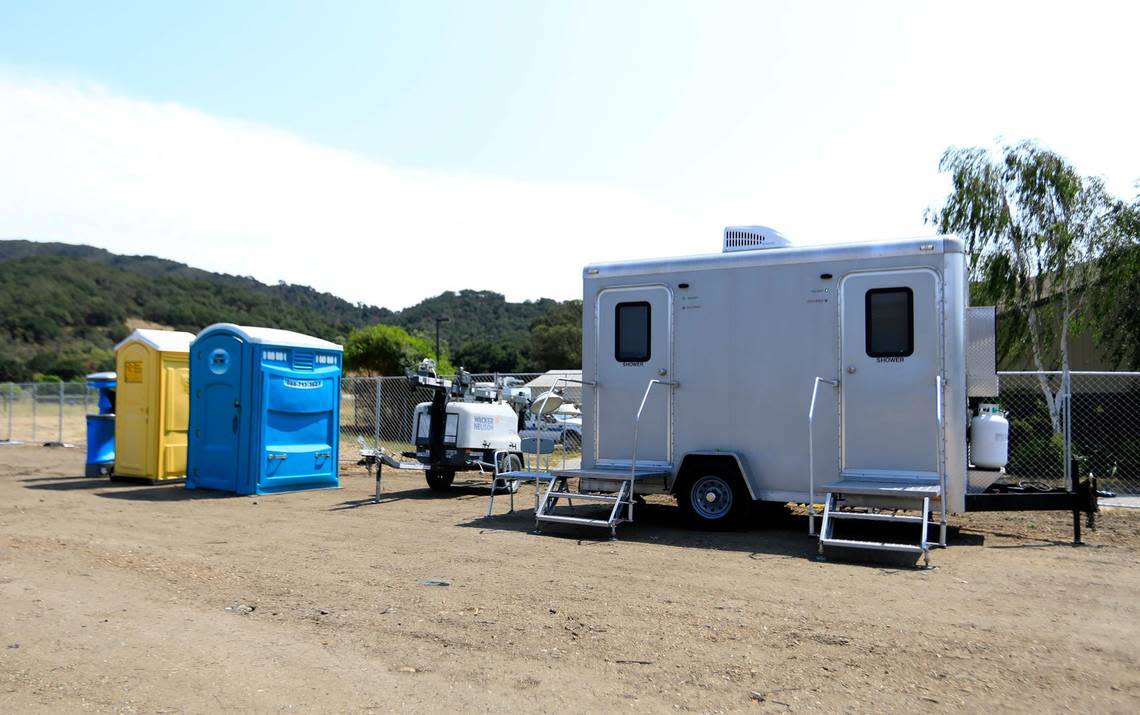
Dissatisfied residents tried to demand more services
Despite there being no permanent, full-time site management at Kansas Avenue, the Community Action Partnership of San Luis Obispo functioned as the primary case management provider for the site’s residents, a duty that included finding housing and helping residents navigate the local network of care providers.
As temporary stays became permanent for some day-one residents, around four dozen formed a union in November to advocate for more services from the county and CAPSLO.
The union’s initial demands focused on taking over the site’s security, gaining water, sewage and electricity hookups for RVs and forming a governing body made up of residents to run the site.
“(Unionizing) makes us feel like we’re not just people living inside of a fence,” union president Mallory Mejia told The Tribune in November.
Dzvonik said the decision to wind down site operations is not related to any tensions between site residents and administrators.
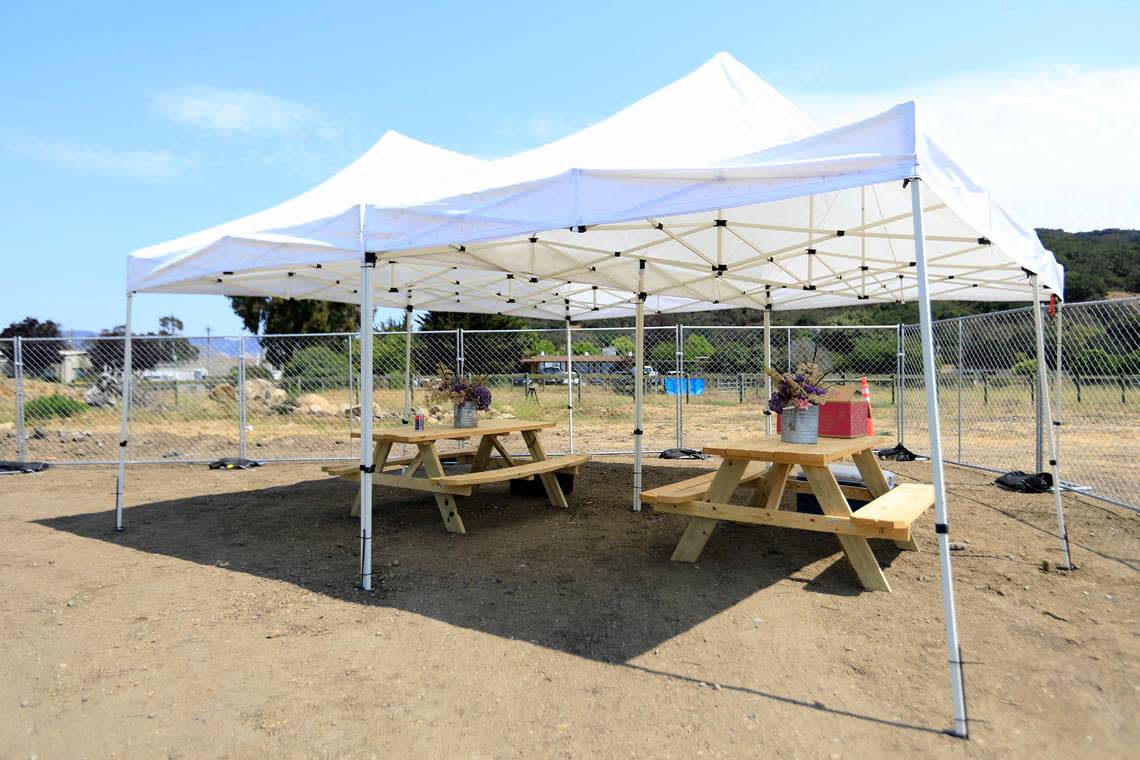
Many residents treated SLO safe parking site as their final home
Another challenge has been encouraging existing residents to see Kansas Avenue as a transitional housing solution as opposed to a permanent community.
“We’re looking at 17, 18 months now it’s been open, and there were some folks that have been out there from day one and there’s still really no plan for them to leave,” Dzvonik said.
Due to the lack of consistent engagement with case management from CAPSLO, some residents began to view the site as their final home.
“It’s not intended for someone to stay there for three, four, five years, or however long they wanted,” Horton said. “It’s not set up to accommodate that type of long-term stay.”
Even when provided with a housing voucher, some residents resisted the idea of being moved into long-term housing because they would still need to pay for some of their housing costs, Dzvonik said.
“That presents a little bit of a challenge because they may not have much money, and they are understandably reluctant to do that right away, because it’s a bit of a shock,” Dzvonik said. “They’re in the mindset that they’re staying in a place with no charge. Now you’re asking to move to a place where they may have to pay some income, of which they may not have any.”
While the site has seen some successful cases over its year and a half of operation, those usually involved individuals who were already close to exiting homelessness or did not require intensive mental health or substance use treatment, Dzvonik said.
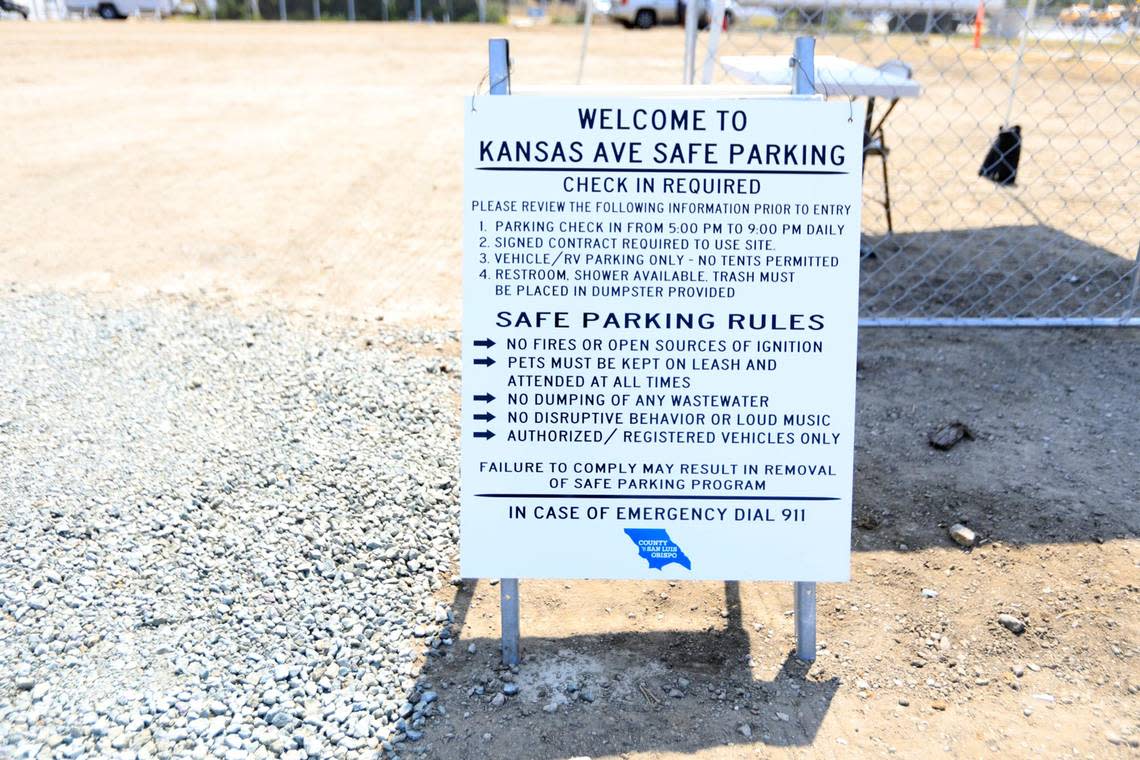
SLO County plans to escalate services at Kansas Avenue as part of transition
By surging the social services directed at Kansas Avenue residents in the coming weeks or months, county officials hope to avoid having to forcibly remove anyone from the property.
Dzvonik said the county plans to engage numerous local agencies and organizations to provide a tailored solution to each individual currently residing at the site.
“We’re going to do what we can to work with folks, but if we have someone that says ‘Well, that’s great. I’m gonna need another year to figure it out.’ We’re not going to continue that site,” Horton said.
“I just want to be very clear that I’m not going to keep the site open for five years because someone doesn’t want to move,” he added. “That’s not gonna be the case.”
Jack Lahey, director of homeless services at CAPSLO, said closing the parking site to new applicants will allow CAPSLO and the other providers who service the site to direct their services toward case management for the current residents.
“We can really focus on our attention on the people there and their situations, and really try to work with them on any barriers that are holding them up from obtaining more secure housing,” Lahey said.
CAPSLO and other providers including ECHO, the 5Cities Homeless Coalition and Transitions-Mental Health Services will work together to match clients with the organization that can best fit their needs, Lahey said.
Lahey acknowledged not all residents will want to accept services or move into transitional or permanent housing.
“If you’re saying no because you don’t want service provision, then maybe it’s just planning how you can be as safe as possible wherever you’re going to be moving,” Lahey said.
Without its onsite case management responsibilities, Lahey said, CAPSLO will be able to divert its four onsite workers and funding for the site toward deeper outreach efforts in Los Osos, Morro Bay, Baywood and the city of San Luis Obispo.
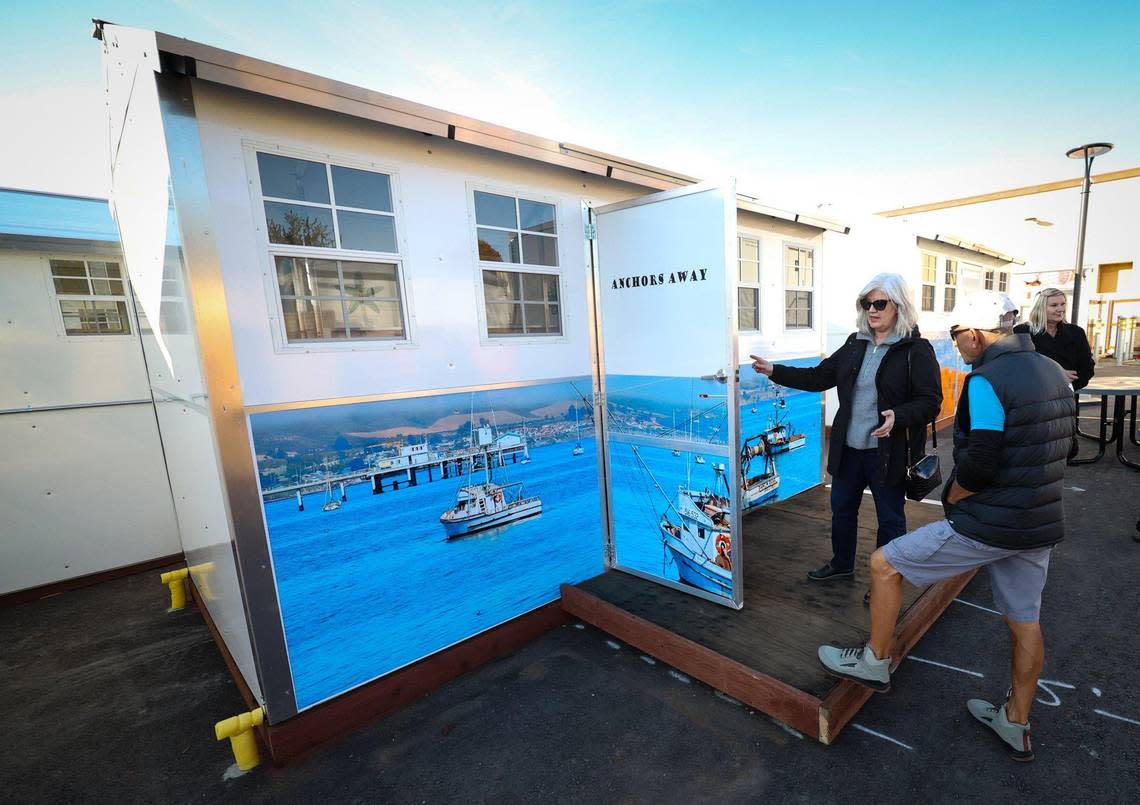
What’s next for transitional housing?
In the coming weeks, Dzvonik said the county will create a transition plan for the current group of residents at Kansas Avenue.
One solution the county is considering is tiny home villages such as the 5Cities Homeless Coalition’s Cabins for Change program, Dzvonik said.
Tiny home villages have several advantages over parking sites, Dzvonik said.
In tiny homes villages residents do not own the buildings they live in, unlike at safe parking sites where residents live in their own RVs. Residents will often voluntarily enter a tiny homes program with the understanding that the program is a transitional step toward stability in sobriety, mental health care, employment or permanent housing.
In the meantime, Dzvonik said the surge in services will focus on getting every resident’s case resolved in an individualized and humane manner.
“This was a difficult but honest assessment,” Dzvonik said. “You just have to admit when something isn’t working, because now you’re just throwing good money at the bad and people’s lives are being affected by this.”
Horton said county staff plans to bring a comprehensive homelessness update to the Board of Supervisors in April, where this transitional plan for Kansas Avenue will be a key component.
Tribune reporter Stephanie Zappelli contributed to this story.
